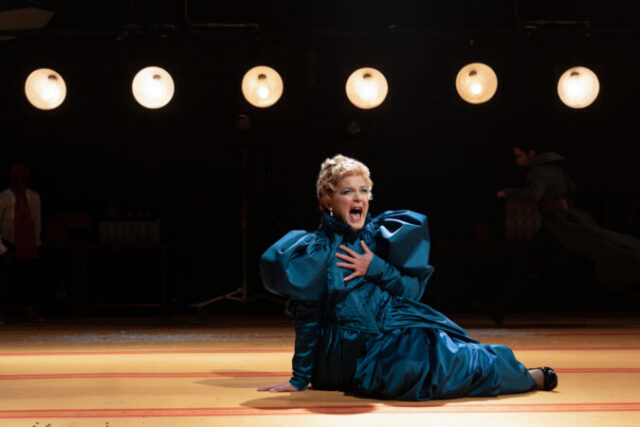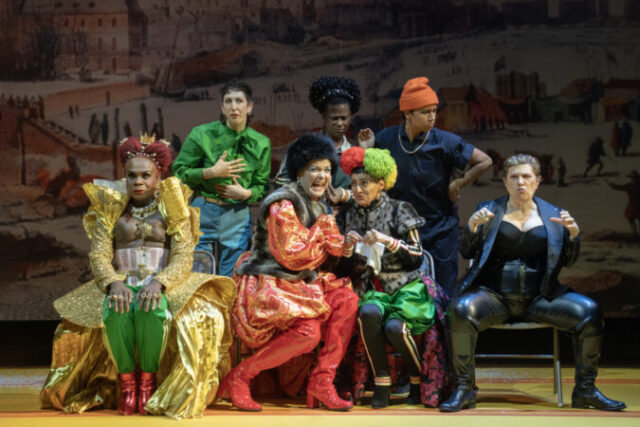
Taylor Mac stars as the title character in Sarah Ruhl’s Orlando at the Signature (photo by Julieta Cervantes)
ORLANDO
The Pershing Square Signature Center
The Irene Diamond Stage
480 West 42nd St. between Tenth & Eleventh Aves.
Tuesday-Sunday through May 12, $45-$119
212-244-7529
www.signaturetheatre.org
Will Davis’s Signature revival of Sarah Ruhl’s Orlando starring Taylor Mac was one of the most hotly anticipated off-Broadway shows of the season. Sadly, it turns out to be one of the most disappointing.
In 1927, Virginia Woolf, struck by sudden inspiration, wrote Orlando: A Biography, a story about a person who wakes up one morning a different gender and experiences life over five hundred years; it was based on Woolf’s relationship with her friend and lover, author and garden designer Vita Sackville-West. “I have written this book quicker than any; & it is all a joke; & yet gay & quick reading I think; a writer’s holiday,” Woolf noted in a letter.
In 1998, Ruhl, just out of Brown University, was asked to write a theatrical adaptation of the novel, which had been made into a film in 1992 written and directed by Sally Potter and featuring Tilda Swinton in the title role. In a burst of enthusiasm, Ruhl wrote the first draft “aided by the intrepid speed of youth,” she explains in a program note to this new production.
Perhaps everyone needed to slow down when it came to this fussy revival.
The trouble begins with Arnulfo Maldonado’s sparse set, which is far too large, the actors lost in the vast space, eliminating any sense of intimacy with the audience. There are several black umbrella lights onstage, as if the cast is in a photography studio, voguing for unseen cameras. Various props, from a long table to a royal throne to miniature trees and houses, appear and disappear, often confusingly, as when the houses are left in the back. Oana Botez’s clownish costumes are way over the top and the cast, aside from Mac — Janice Amaya, Nathan Lee Graham, Lisa Kron, Jo Lampert, Rad Pereira, and TL Thompson — is inconsistent, some actors bland, others downright annoying as they portray multiple characters. The hundred-minute play also doesn’t benefit from having an intermission to separate the sixteenth and seventeenth centuries from the eighteenth to twentieth; not all audience members returned after the break to what was already far from a full house.
The unsteady narrative goes back and forth between the characters engaging in dialogue and speaking in the third person directly to the audience. The break comes after the following exchange, which more than hints at the current controversy over gender identity:
Chorus: We have no choice but to confess . . . he was a woman.
Chorus: No human being, since the world began, has ever looked more ravishing.
Their form combined in one the strength of a man and a woman’s grace.
Chorus: And here we pause. Orlando had become a woman — there is no denying it.
Chorus: But in every other respect, Orlando remained precisely as they had been.
Chorus: The change of sex, though it altered their future, did nothing whatever to alter their identity. Their faces remained, as their portraits prove, practically the same.
Chorus: Many people have been at pains to prove, first, that Orlando had always been a woman, and secondly, that Orlando is at this moment a man.
Chorus: Let biologists and psychologists argue.
Chorus: It is enough for us to state the simple fact:
Chorus: Orlando was a man till the age of thirty, when she became a woman and has remained so ever since.
Orlando: I want to go home. To England.

A clownish cast of characters is part of disappointing revival (photo by Julieta Cervantes)
Over the course of half a millennia, Orlando falls in and out of love, is harassed, meets Shakespeare, and tries their hand at poetry. Orlando also discovers the societal shortcomings of being a woman. “How odd! When I was a young man, I insisted that women be obedient, chaste, and scented. Now I shall have to pay in my own person for those desires. For women are not — ” Orlando gets cut off, then continues, “obedient, chaste, and scented by nature. They can only attain these graces by tedious discipline. There’s the hairdressing . . . that alone will take at least an hour of my morning . . . there’s looking in the looking glass . . . there’s being chaste year in and year out. . . . Christ Jesus! When I set foot on English soil, I shall never be able to crack a man over the head, or draw my sword and run him through the body, or lead an army . . . All I can do is to pour out tea and ask my lords how they like it.”
Orlando also discovers that despite now being a woman, they are still in love with Sasha, a Russian princess, while beginning to feel the effects of gender discrimination. Orlando soon learns, “One: That you are dead, and therefore cannot hold any property whatsoever. Two: That you are a woman, which amounts to much the same thing.”
Ruhl (Letters from Max, a ritual; The Oldest Boy; Pulitzer finalist In the Next Room, or the vibrator play) and Davis (India Pale Ale, Men on Boats) make those points over and over again as scenes go on too long and some of the play’s unique visuals are repeated until tiresome. Too often it’s like we’re watching an episode of RuPaul’s Drag Race mixed with a dose of Forrest Gump instead of a meaningful and funny historical drama dealing with gender inequality, sexual orientation, power, and love. Even the endlessly inventive Mac (A 24-Decade History of Popular Music, Bark of Millions) is unable to lift the show.
Woolf’s book might have been ahead of its time, but this production, coming almost one hundred years after the novel, feels dated, stale, and out of place, already past its prime.
[Mark Rifkin is a Brooklyn-born, Manhattan-based writer and editor; you can follow him on Substack here.]